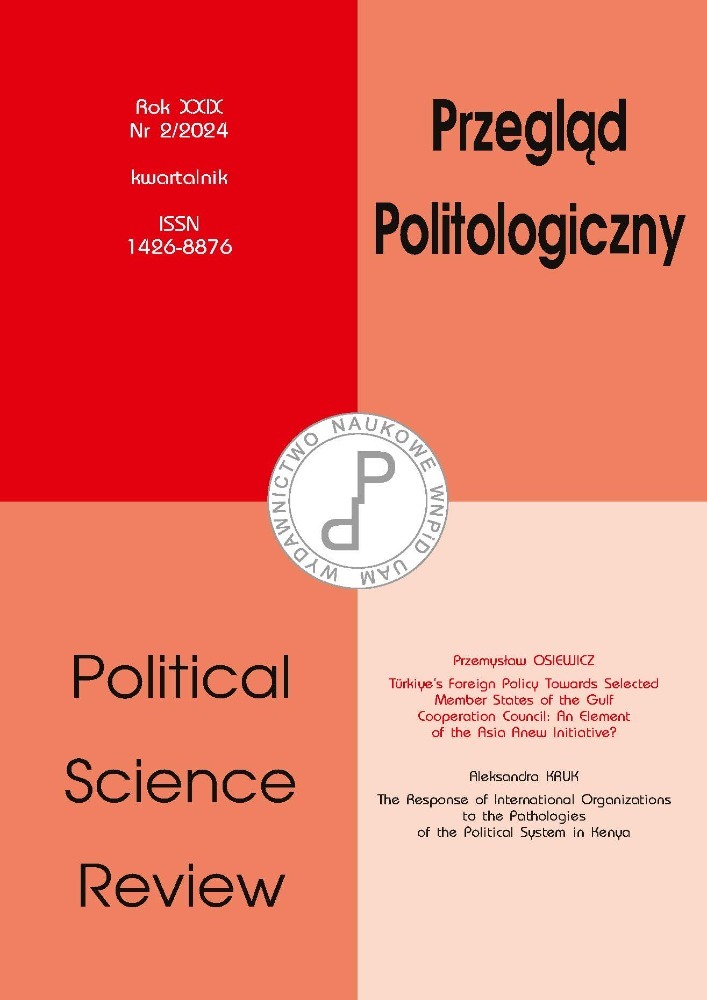Abstrakt
okresie od X do XII wieku Ukraina – wówczas Ruś Kijowska – była silnym samodzielnym państwem, jednak w wyniku sporów wewnętrznych oraz podbojów została osłabiona i stała się lennem lub częścią innych jednostek państwowych. Od XVII w. w wyniku ugód perejesławskich (1654 i 1659) pomiędzy kozakami i Moskwą, znalazła się w orbicie coraz silniejszego wpływu Rosji, pod którym pozostała aż do rozpadu najgorszego i najbardziej destrukcyjnego dla ukraińskiej państwowości „więzienia narodów”, to znaczy ZSRR. Pod wpływem rosyjskiej propagandy świat przez długi czas postrzegał Ukrainę jako integralną część Rosji, mającą z nią wiele wspólnego pod względem historii i kultury. Jednak w rzeczywistości współczesna Ukraina i Rosja to dwa różne kraje o zróżnicowanych systemach politycznych, wektorach rozwoju, tożsamości, mentalności, fundamentalnych wartościach, tradycjach itp. Społeczeństwo ukraińskie, jakkolwiek w czasach komunistycznych poddawane konsekwentnej sowietyzacji, a po upadku ZSRR będące obiektem działań politycznych i propagandowych Federacji Rosyjskiej, jest fundamentalnym przeciwieństwem autorytarnego społeczeństwa rosyjskiego. Pozostaje natomiast zbliżone do demokratycznej społeczności europejskiej. Od wieków władze rosyjskie dążyły do kolonizacji i wykorzystania Ukrainy (Ukraińców i ziem ukraińskich) w swoich własnych interesach: niszczyły ukraińską tożsamość i mentalność, zakazywały języka i tradycji, zabijały liderów politycznych i działaczy patriotycznych, przepisywały i przypisywały sobie wielką historię Ukrainy (szczególnie czasy Rusi Kijowskiej), osiągnięcia intelektualne, zasoby itp. Jednak pomimo rusyfikacji, licznych manipulacji i zbrodni popełnionych przeciwko narodowi ukraińskiemu, Rosja nie zdołała go w pełni zasymilować. To właśnie europejski, zachodni wektor rozwoju Ukrainy i jej dążenie do wyjścia ze strefy wpływów Rosji jest jednym z głównych powodów obecnej pełnoskalowej wojny. Największe podobieństwa między Ukrainą a państwami europejskimi na poziomie mentalności to ukraińska miłość do wolności, indywidualizm i pragnienie demokracji w przeciwieństwie do rosyjskiego despotyzmu i autorytaryzmu. Te specyficzne cechy ukraińskiej mentalności umożliwiły historyczne zachowanie i ożywienie narodu ukraińskiego, pomagają w dalszym rozwoju i dają Ukrainie nadzieję na jej dalszy rozwój nie tylko pod względem geograficznym i ekonomicznym, ale także mentalnym czy duchowym.
Bibliografia
Barsukova O. (2021), Zhorstokyy rozhin Maydanu: spohady ukrayintsiv pro 30 lystopada, “Ukrayinsʹka pravda”, https://life.pravda.com.ua/SOCIETY/2021/11/30/246667/.
Centrum Badania Opinii Społecznej (CBOS) (2022), Polacy wobec wojny na Ukrainie i ukraińskich uchodźców, Komunikat z badań, no. 101, pp. 1–13.
Centrum Badania Opinii Społecznej (CBOS) (2023), Polacy wobec wojny na Ukrainie, Komunikat z badań, no. 42, pp. 1–11.
Chekalenko L. (2022), Ukraine in the Integration Security System, „Przegląd Politologiczny”, no. 3, pp. 69–80, DOI:10.14746/pp.2022.27.3.6. DOI: https://doi.org/10.14746/pp.2022.27.3.6
History of philosophy. Dictionary (2006), In general ed. V. Yaroshovets, Kyiv.
Hordiichuk O. (2019), Vplyv komunistychnoyi ideolohiyi ta radyansʹkoyi diysnosti na mentalʹnistʹ ukrayintsiv: sotsialʹno-filosofsʹkyy analiz, “Visnyk Lʹvivsʹkoho universytetu. Seriya «Filosofsʹko-politychni doslidzhennya»”, no. 24, pp. 25–31, http://fps-visnyk.lnu.lviv.ua/archive/24_2019/5.pdf. DOI: https://doi.org/10.30970/2307-1664.2019.24.3
Hordiichuk O. (2023), The Ideological and Ontological Causes of Russia’s War on Ukraine. West versus East, Tyranny versus Democracy, “Ethnic in progress”, vol. 14, 1, pp. 4–23, https://doi.org/10.14746/eip.2023.1.1. DOI: https://doi.org/10.14746/eip.2023.1.1
Hordiichuk O., Halapsis A., Kozlovets M. (2023), How the information warfare turns into full-scale military agression: the experience of Ukraine, “Przegląd Strategiczny”, (16), pp. 345–362, https://doi.org/10.14746/ps.2023.1.25. DOI: https://doi.org/10.14746/ps.2023.1.25
Hordiichuk О. (2018), Arkhetypy ukrainskoi mentalnosti: sotsialno-filosofskyi analiz, „Visnyk Zhytomyrskoho derzhavnoho universytetu imeni Ivana Franka. Filosofski nauky”, 1 (84), pp. 15–19, http://eprints.zu.edu.ua/27850/.
Hordiichuk O. (2021), Mentality in the age of globalization, Zhytomyr, 372 p.
Hrabovska I. (2000), Ukrayinsʹka mentalʹnistʹ krizʹ pryzmu ХХ st., “Pam’yatʹ stolitʹ”, 1, pp. 3–13.
Hrushevsky M. (1991), Who are the Ukrainians and what do they want, Kyiv.
Kostiushko O., Halchenko V. (2022), Ukrainian nation’s European integration transformation through the prizm of Russian ivasion in Ukraine, “The security architecture of European and Euro-Atlantic spaces”, http://www.baltijapublishing.lv/omp/index.php/bp/catalog/download/247/6960/14484-1?inline=1.
Krushelnycky A. (2008), Ukraine risks wrath of Russia as Yushchenko sides with the West, “Independent”, https://www.independent.co.uk/news/world/europe/ukraine-risks-wrath-of-russia-as-yushchenko-sides-with-the-west-902906.html.
Krymsky S. (2004), During the centuries Ukraine has always been an integral part of Europe, “War and peace”, Kyiv.
Kuceruk O. (2008), KONOVALETSʹ Yevhen. Entsyklopediya istoriyi Ukrayiny, T. 5: NAN Ukrayiny, Instytut istoriyi Ukrayiny, Kyiv, http://www.history.org.ua/?termin=Konovalets_E.
Kuzio T. (2005), Ukraine’s Orange Revolution: The Opposition’s Road to Success, “Journal of Democracy”, vol. 16, no. 2, pp. 117–130, https://doi.org/10.1353/jod.2005.0028. DOI: https://doi.org/10.1353/jod.2005.0028
Kyrychenko YU. (2011), Poshyrennya Mahdeburzʹkoho prava ta yoho osoblyvosti v mistakh Ukrayiny, “Forum prava” 4, pp. 361–366, https://dspace.univd.edu.ua/server/api/core/bitstreams/69419487-243b-4575-a5c0-6596a7250f22/content.
Lypynsky V. (2010), Lysty do brativ-khliborobiv (vstup i chastyna persha), V’yacheslav Lypynsʹkyy i yoho doba: Knyha persha, Kyiv, pp. 92–214.
Lysyak-Rudnytsky I. (1993), Ukrayina mizh Skhodom i Zakhodom. Istoriya filosofiyi Ukrayiny, Kyiv.
Ministerstvo yustytsiyi Ukrayiny (2024), Yak Ukrayina rukhayetʹsya do YES, https://minjust.gov.ua/m/yak-ukraina-ruhaetsya-do-es.
Nagielski M. (2010), Ukraińcy, in: Pod wspólnym niebiem. Narody dawnej Rzeczpospolitej, eds. by M. Kopczyński, W. Tygielski, Muzeum Historii Polski, Warszawa, pp. 55–78.
Pidtrymka hromadyan vstupu Ukrayiny do NATO ta YES perebuvaye na rekordno vysokomu rivni (2023) Kyyivsʹkyy Mizhnarodnyy Instytut Sotsiolohiyi, https://eu-ua.kmu.gov.ua/news/pidtrymka-gromadyan-vstupu-ukrayiny-do-nato-ta-yes-perebuvaye-na-rekordno-vysokomu-rivni/.
Rafalskyi I. (2016), Natsionalʹno-derzhavne samovyznachennya Ukrayiny: vnutrishni faktory ta zovnishni vplyvy, Kyiv–Nizhyn.
Revolyutsiya Hidnosti (2023), https://maidanmuseum.org/uk/storinka/revolyuciya-gidnosti.
Romanova V., Umland A. (2021), Reforma detsentralizatsiyi v Ukrayini: pershi rezulʹtaty ta vyklyky. Politychni doslidzhennya, “Political Studies” 1, pp. 41–51, http://pd.ipiend.gov.ua/article/view/235422. DOI: https://doi.org/10.53317/2786-4774-2021-1-3
Safaryans E. (2019), Ukrayina na shlyakhu vid yevraziysʹkoyi do yevropeysʹkoyi tsyvilizatsiy, “Drynovsʹkyy zbirnyk”, 9, pp. 342–346, https://doi.org/10.7546/DS.2016.09.35. DOI: https://doi.org/10.7546/DS.2016.09.35
Samygin D. (2023), Desyatʹ pryyomiv kremlivsʹkoyi propahandy pid chas rosiysʹkoyi viyny u Hruziyi ta Ukrayini, “Ukrayinsʹka pravda”, https://www.pravda.com.ua/columns/2023/08/8/7414729/.
Shandro V. (2022), Neodnoznachna postatʹ chy natsionalʹnyy heroy. Symon Petlyura, “Suspilʹne: kulʹtura”, https://suspilne.media/culture/36145-simon-petlura-neodnoznacna-postat-ci-nacionalnij-geroj/.
Shveda Y., Park J. H. (2016), Ukraine’s revolution of dignity: The dynamics of Euromaidan, “Journal of Eurasian Studies”, vol. 7(1), pp. 85–91, https://doi.org/10.1016/j.euras.2015.10.007. DOI: https://doi.org/10.1016/j.euras.2015.10.007
Snyder T. (2022), The War in Ukraine Is a Colonial War, The New Yorker, https://www.newyorker.com/news/essay/the-war-in-ukraine-is-a-colonial-war.
Sushko O. (2008), Ukrayina – nastupna?, „Ukrayinsʹka pravda”, https://www.pravda.com.ua/articles/2008/08/12/3517426/.
Suspilʹno-politychni pohlyady v Ukrayini (2021), Center for Insights in Survey Research, https://www.iri.org.ua/sites/default/files/editor-files/Ukraine_NationalSurvey_Mar2021.pdf.
Svyrydenko D., Revin F. (2023), Embracing the Philosophy of Responsible Citizenship – On a Path to Ukraine’s Societal Transformation, “Studia Warmińskie”, vol. 60, pp. 119–134, https://doi.org/10.31648/sw.9567. DOI: https://doi.org/10.31648/sw.9567
V Ukrayini rizko roste pidtrymka vstupu Ukrayiny do Yevrosoyuzu i NATO (2014), TSN, https://tsn.ua/politika/v-ukrayini-rizko-roste-pidtrimka-vstupu-ukrayini-do-yevrosoyuzu-i-nato-356430.html.
Wilson A. (2005), Ukraine’s Orange Revolution, Yale University Press.
Yevrointehratsiya v umovakh viyny: vyklyky i perspektyvy. Analitychna dopovidʹ (2023), https://razumkov.org.ua/images/2022/12/28/2022-MATRA-IV-KVARTAL-7.pdf.
Licencja
Prawa autorskie (c) 2024 Olha Hordiichuk, Tomasz Dekert, Yulia Lysetska

Utwór dostępny jest na licencji Creative Commons Uznanie autorstwa – Na tych samych warunkach 4.0 Miedzynarodowe.

